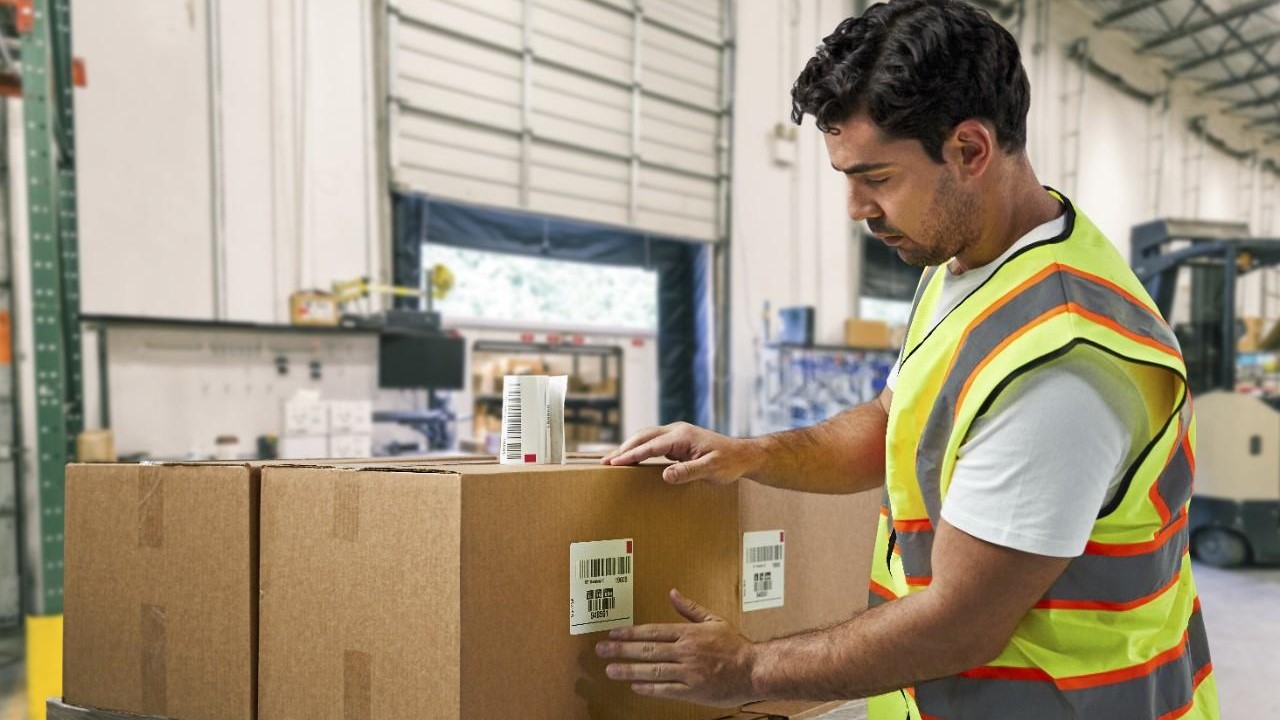Zebra's Industry Solutions can give your business a competitive advantage by connecting people, assets and data to help you make better decisions.
Scale and energise your retail strategy with a digital backbone that unifies your team, informs priorities and drives results with Zebra's retail technology solutions.
Zebra's healthcare technology solutions provide patient identity management, mobile health devices, and business intelligence data to improve efficiency.
Zebra’s manufacturing technology solutions enable manufacturers to become more agile, optimise plant floor performance and embrace market changes.
Zebra's market-leading solutions and products improve customer satisfaction with a lower cost per interaction by keeping service representatives connected with colleagues, customers, management and the tools they use to satisfy customers across the supply chain.
In today's world, the demands on transportation and logistics companies are higher than ever. Dedicated Warehouse, Fleet and Delivery, and Yard and Terminal solutions enable visibility to every aspect of your business and keep operations running flawlessly around the clock.
Zebra's hospitality technology solutions equip your hotel and restaurant staff to deliver superior customer and guest service through inventory tracking and more.
Empower your field workers with purpose-driven mobile technology solutions to help them capture and share critical data in any environment.
Zebra’s mobile computing, scanning, and printing solutions connect each operational area in your warehouse to give you the agility to realize transformational gains.
Zebra's range of mobile computers equip your workforce with the devices they need from handhelds and tablets to wearables and vehicle-mounted computers.
Zebra's desktop, mobile, industrial, and portable printers for barcode labels, receipts, RFID tags and cards give you smarter ways to track and manage assets.
Zebra's 1D and 2D corded and cordless barcode scanners anticipate any scanning challenge in a variety of environments, whether retail, healthcare, T&L or manufacturing.
Zebra's extensive range of RAIN RFID readers, antennas, and printers give you consistent and accurate tracking.
Choose Zebra's reliable barcode, RFID and card supplies carefully selected to ensure high performance, print quality, durability and readability.
Zebra's location technologies provide real-time tracking for your organisation to better manage and optimise your critical assets and create more efficient workflows.
Zebra's rugged tablets and 2-in-1 laptops are thin and lightweight, yet rugged to work wherever you do on familiar and easy-to-use Windows or Android OS.
With Zebra's family of fixed industrial scanners and machine vision technologies, you can tailor your solutions to your environment and applications.
Discover Zebra’s range of accessories from chargers, communication cables to cases to help you customise your mobile device for optimal efficiency.
Zebra's OEM scan engines, imagers, and private label OEM products offer flexible integration and help enhance product development with modern OEM technology.
Zebra's environmental sensors monitor temperature-sensitive products, offering data insights on environmental conditions across industry applications.
Keep labour costs low, your talent happy and your organisation compliant. Create an agile operation that can navigate unexpected schedule changes and customer demand to drive sales, satisfy customers and improve your bottom line.
Empower the front line with prioritized task notification and enhanced communication capabilities for easier collaboration and more efficient task execution.
Get full visibility of your inventory and automatically pinpoint leaks across all channels.
Reduce uncertainty when you anticipate market volatility. Predict, plan and stay agile to align inventory with shifting demand.
Drive down costs while driving up employee, security, and network performance with software designed to enhance Zebra's wireless infrastructure and mobile solutions.
Explore Zebra’s printer software to integrate, manage and monitor printers easily, maximising IT resources and minimising down time.
Make the most of every stage of your scanning journey from deployment to optimization. Zebra's barcode scanner software lets you keep devices current and adapt them to your business needs for a stronger ROI across the full lifecycle.
RFID development, demonstration and production software and utilities help you build and manage your RFID deployments more efficiently.
RFID development, demonstration and production software and utilities help you build and manage your RFID deployments more efficiently.
Zebra DNA is the industry’s broadest suite of enterprise software that delivers an ideal experience for all during the entire lifetime of every Zebra device.
Advance your digital transformation and execute your strategic plans with the help of the right location and tracking technology.
The Zebra Aurora suite of machine vision software enables users to solve their track-and-trace, vision inspection and industrial automation needs.
Zebra Aurora Focus brings a new level of simplicity to controlling enterprise-wide manufacturing and logistics automation solutions. With this powerful interface, it’s easy to set up, deploy and run Zebra’s Fixed Industrial Scanners and Machine Vision Smart Cameras, eliminating the need for different tools and reducing training and deployment time.
Aurora Imaging Library™, formerly Matrox Imaging Library, machine-vision software development kit (SDK) has a deep collection of tools for image capture, processing, analysis, annotation, display, and archiving. Code-level customization starts here.
Aurora Design Assistant™, formerly Matrox Design Assistant, integrated development environment (IDE) is a flowchart-based platform for building machine vision applications, with templates to speed up development and bring solutions online quicker.
Designed for experienced programmers proficient in vision applications, Aurora Vision Library provides the same sophisticated functionality as our Aurora Vision Studio software but presented in programming language.
Aurora Vision Studio, an image processing software for machine & computer vision engineers, allows quick creation, integration & monitoring of powerful OEM vision applications.
Adding innovative tech is critical to your success, but it can be complex and disruptive. Professional Services help you accelerate adoption, and maximise productivity without affecting your workflows, business processes and finances.
Zebra's Managed Service delivers worry-free device management to ensure ultimate uptime for your Zebra Mobile Computers and Printers via dedicated experts.
Find ways you can contact Zebra Technologies’ Support, including Email and Chat, ask a technical question or initiate a Repair Request.
Zebra's Circular Economy Program helps you manage today’s challenges and plan for tomorrow with smart solutions that are good for your budget and the environment.

What Will It Take to Make Direct Store Delivery More Manageable and Cost-Effective?
You need to get more SKUs to more stores more frequently, which means you may need to enlist the help of more drivers and merchandisers. So, you may need to rethink how you plan, coordinate, and execute DSD.
Mark Delaney has seen the power and the pitfalls of direct store delivery over the years, both in a professional and personal capacity. He has come to understand what must happen in the first, middle, and last miles to ensure that the right product is stocked on shelves at the right time, in the right way, with the right pricing.
That’s why I asked him to join our latest episode of the Your Edge podcast.
Mark is now the Mobility Solutions Leader at Körber Supply Chain Software, where he’s leveraging his extensive experience in retail and consumer packaged goods to help manufacturers and their distributors find new efficiencies in their operations. One area in which he helps drive improvements is direct store delivery (DSD). In the past, he has also advised supply chain organizations from the point of production to the point of sale on how to get goods to customers more quickly, sustainably, and cost-effectively.
So, I asked Mark if he could share his thoughts on:
What retailers and their distribution partners upstream must do to scale operations faster and make sure DSD drivers and merchandisers can move faster to serve more customers and get more products to market.
How direct store delivery has changed for better or worse in recent years and what it takes today to keep DSD operations running smoothly from the first to the last mile.
What types of changes CPG companies should consider making to their DSD operations and systems, especially if trying to get costs down or reduce waste.
How environmental sensors, RFID, and other data collection technology could help improve DSD outcomes as well as overall production planning and inventory management for CPG companies and retailers.
What software might best support information flows and other communication between field and production facility teams and how AI should factor.
Whether there is a cost-savings argument, or maybe even a sustainability benefit, to using DSD for all food and beverage, health and beauty, or even electronics categories.
Hear what he had to say:
Prefer to listen later? Download the MP3 to listen offline:
What Would Make Direct Store Delivery More Efficient and Cost-Effective?
You can also scan through the transcript here.
###
If you're curious how AI can fit into your DSD operations, check this out:
How AI is Redefining Direct Store Delivery
You may also be interested in hearing about the changes Bimbo Bakeries USA made to improve DSD:
You can also read more about Bimbo’s successful outcomes here:
Bimbo Bakeries USA Improves Order Accuracy, Minimizes Waste
And if you need to catch up on past discussions with Mark and other supply chain experts from Körber Supply Chain Software, start here...
- Wondering How to Improve Warehouse Operations? Not Sure If Any Single “Solution” Will Work Like You Want? Put People First, Says One Supply Chain Executive, and Everything Will Be Okay.
- Curious Why, When, and How You Should Be Using AI in Your Warehouse or Other Supply Chain Operations?
- Why You Should Be Talking More About Voice Technology with Warehouse Managers and Associates
- You May Have Found a Way to Be Compliant with DSCSA, but Are Those System and Process Changes Making Any Difference Elsewhere in Your Organization?

Mark Butler
Mark Butler is a Global Partner Manager within Zebra’s global sales team and is the global leader for Zebra’s partnerships with both HP, Inc. and Körber Supply Chain. Mark has a focus on Zebra’s AMR and warehouse strategies with Körber and Zebra’s Managed Print and Government strategies with HP, Inc.
Mark is based in Cleveland, Ohio. He has been working within Zebra’s channel go-to-market organization since 2011 and has 20+ years in the industry.
Zebra Developer Blog
Zebra Developer Blog
Are you a Zebra Developer? Find more technical discussions on our Developer Portal blog.
Zebra Story Hub
Zebra Story Hub
Looking for more expert insights? Visit the Zebra Story Hub for more interviews, news, and industry trend analysis.
Search the Blog
Search the Blog
Use the below link to search all of our blog posts.
Most Recent
Legal Terms of Use Privacy Policy Supply Chain Transparency
ZEBRA and the stylized Zebra head are trademarks of Zebra Technologies Corp., registered in many jurisdictions worldwide. All other trademarks are the property of their respective owners. ©2024 Zebra Technologies Corp. and/or its affiliates.





